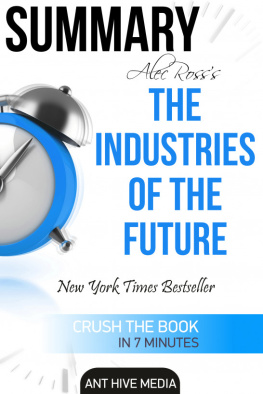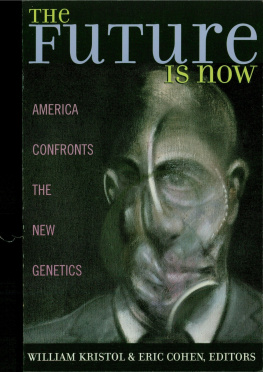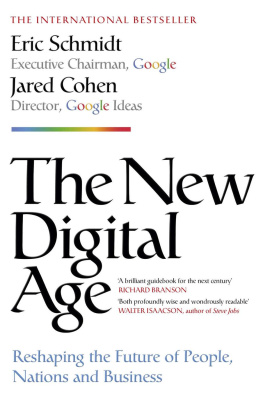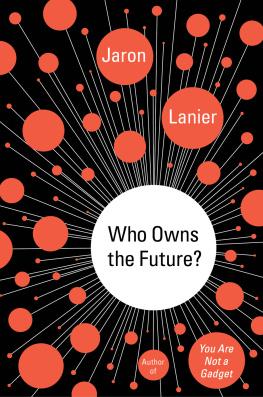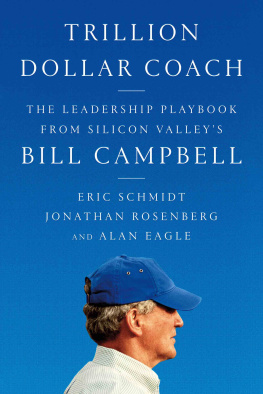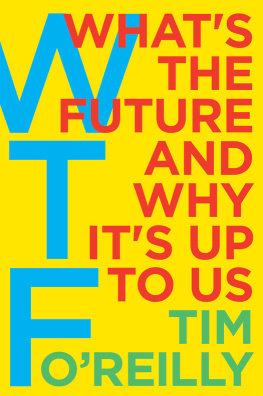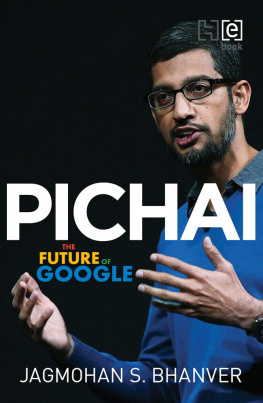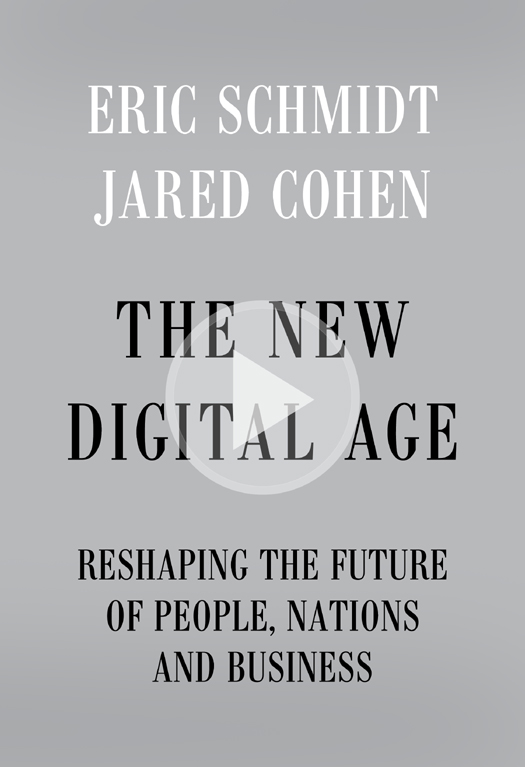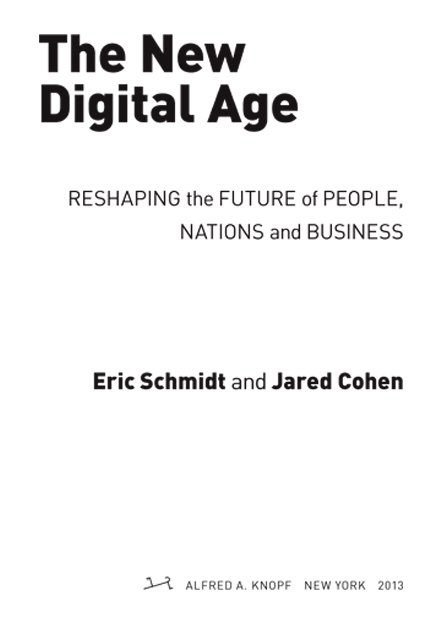Advance praise for The New Digital Age
This is the most importantand fascinatingbook yet written about how the digital age will affect our world. With vivid examples and brilliant analysis, it shows how the internet and other communications technologies will empower individuals and transform the way nations and businesses operate. How will different societies make trade-offs involving privacy, freedom, control, security and the relationship between the physical and virtual worlds? This realistic but deeply optimistic book provides the guideposts. Its both profoundly wise and wondrously readable.
Walter Isaacson, author of Steve Jobs
Every day, technological innovations are giving people around the world new opportunities to shape their own destinies. In this fascinating book, Eric Schmidt and Jared Cohen draw upon their unique experiences to show us a future of rising incomes, growing participation and a genuine sense of community if we make the right choices today.
Bill Clinton
Eric Schmidt and Jared Cohen have produced a searching meditation on technology and world order. Even those who disagree with some of their conclusions will learn much from this thought-provoking volume.
Henry A. Kissinger
This is the book I have been waiting for: a concise and persuasive description of technologys impact on war, peace, freedom and diplomacy. The New Digital Age is a guide to the future written by two experts who possess a profound understanding of humanitys altered prospects in a wireless world. There are insights on every page and surprising conclusions (and questions) in every chapter. For experts and casual readers alike, Eric Schmidt and Jared Cohen have produced an indispensable book.
Madeleine Albright
The New Digital Age is must-reading for anyone who wants to truly understand the depths of the digital revolution. Combining the skills of a social scientist and a computer scientist, Schmidt and Cohen blend the technical and the human, the scientific and the political, in ways I rarely saw while in government. They challenge the readers imagination on almost every page.
General Michael Hayden, former director of the CIA
This is a book that describes a technological revolution in the making. How we navigate it is a challenge for countries, communities and citizens. There are no two people better equipped to explain what it means than Eric Schmidt and Jared Cohen.
Tony Blair
Few people in the world are doing more to imagineand buildthe new digital age than Eric Schmidt and Jared Cohen. With this book, they are looking into their crystal ball and inviting the world to peek in.
Michael R. Bloomberg
Eric Schmidt and Jared Cohens thoughtful, well-researched work elucidates the staggering impact of technology on our daily lives, as well as what surprising and incredible developments the future may hold. Readers might be left with more questions than answers, but thats the ideawe are at our best when we ask Whats next?
Elon Musk, cofounder of Tesla Motors and PayPal
THIS IS A BORZOI BOOK
PUBLISHED BY ALFRED A. KNOPF
Copyright 2013 by Google Inc. and Jared Cohen
All rights reserved. Published in the United States by Alfred A. Knopf, a division of Random House, Inc., New York, and in Canada by Random House of Canada Limited, Toronto.
www.aaknopf.com
Knopf, Borzoi Books, and the colophon are registered trademarks of Random House, Inc.
Library of Congress Cataloging-in-Publication Data is on file at the Library of Congress
eBook ISBN: 9780307961105
Hardcover ISBN: 9780307957139
Cover design by Peter Mendelsund
v3.1
For Rebecca, to whom we are grateful for her ideas and support, and Aiden, of whom we are envious for the technology he will get to see
We should all be concerned about the future because we will have to spend the rest of our lives there.
C HARLES F. K ETTERING ,
American inventor and businessman
CONTENTS
Introduction
impact on the world stage.
The Internet is the largest experiment involving anarchy in history. Hundreds of millions of people are, each minute, creating and consuming an untold amount of digital content in an online world that is not truly bound by terrestrial laws. This new capacity for free expression and free movement of information has generated the rich virtual landscape we know today. Think of all the websites youve ever visited, all the e-mails youve sent and stories youve read online, all the facts youve learned and fictions youve encountered and debunked. Think of every relationship forged, every journey planned, every job found and every dream born, nurtured and implemented through this platform. Consider too what the lack of top-down control allows: the online scams, the bullying campaigns, the hate-group websites and the terrorist chat rooms. This is the Internet, the worlds largest ungoverned space.
As this space grows larger, our understanding of nearly every aspect it is the first that will make it possible for almost everybody to own, develop and disseminate real-time content without having to rely on intermediaries.
And weve barely left the starting blocks.
The proliferation of communication technologies has from 750 million to well over 5 billion (it is now over 6 billion). Adoption of these technologies is spreading to the farthest reaches of the planet, and, in some parts of the world, at an accelerating rate.
By 2025, the majority of the worlds population will, in one generation, have gone from having virtually no access to unfiltered information to accessing all of the worlds information through a device that fits in the palm of the hand. If the current pace of technological innovation is maintained, most of the projected eight billion people on Earth will be online.
At every level of society, connectivity will continue to become more affordable and practical in substantial ways. People will have access to ubiquitous wireless Internet networks that are many times Eventually, the accoutrements of technologies we marvel at today will be sold in flea markets as antiques, like rotary phones before them.
And as adoption of these tools increases, so too will their speed and computing power. augmented reality, which promises a visual overlay of digital information onto our physical environment. Such developments will join with and enhance elements of our natural world.
This is our future, and these remarkable things are already beginning to take shape. That is what makes working in the technology industry so exciting today. Its not just because we have a chance to invent and build amazing new devices or because of the scale of technological and intellectual challenges we will try to conquer; its because of what these developments will mean for the world.
Communication technologies represent opportunities for some governments make it difficult), and you always have something to occupy your attention, although finding a way to do so usefully may still prove difficult and in some cases harder. The smart phone is aptly named.
As global many old institutions and hierarchies will have to adapt or risk becoming obsolete, irrelevant to modern society. The struggles we see today in many businesses, large and small, are examples of the dramatic shift for society that lies ahead. Communication technologies will continue to change our institutions from within and without. We will increasingly reach, and relate to, people far beyond our own borders and language groups, sharing ideas, doing business and building genuine relationships.


